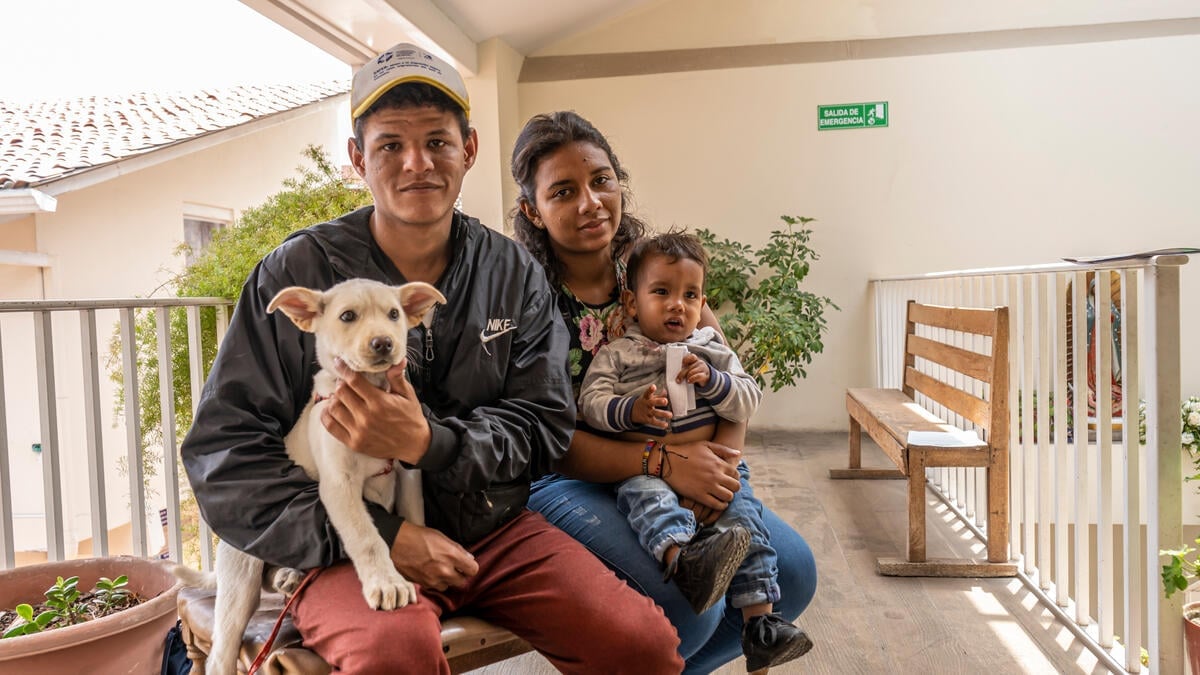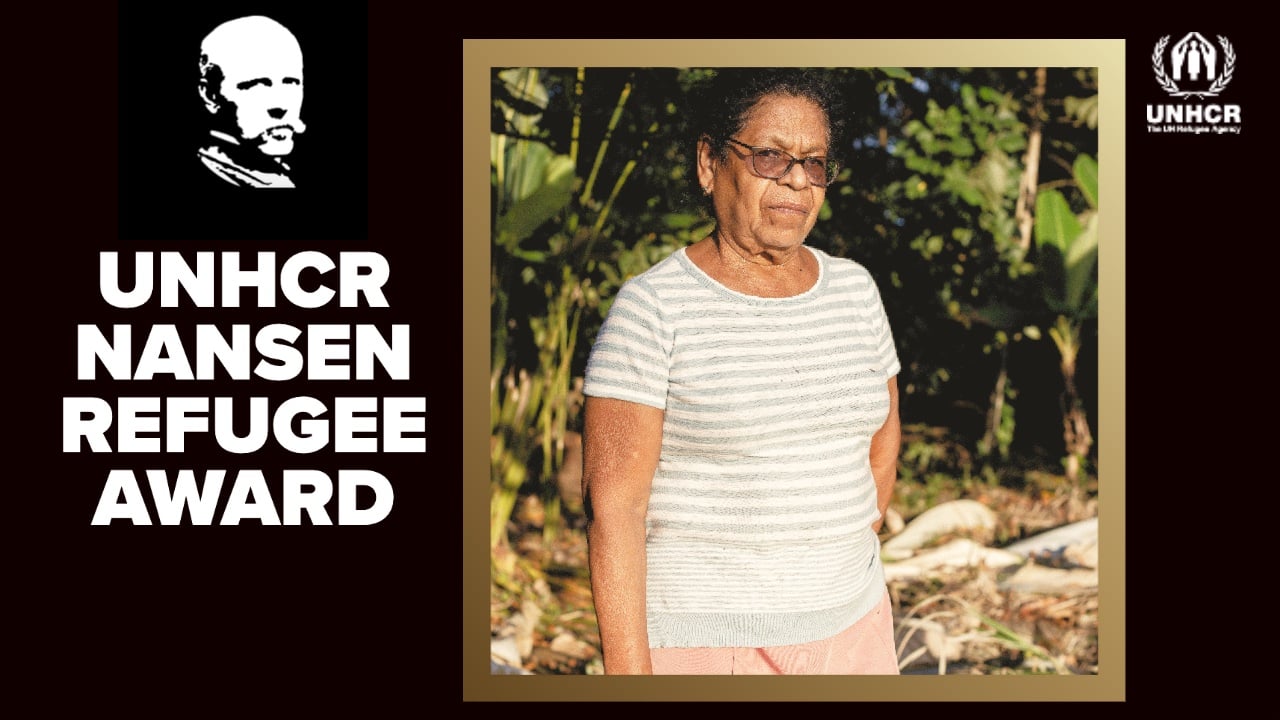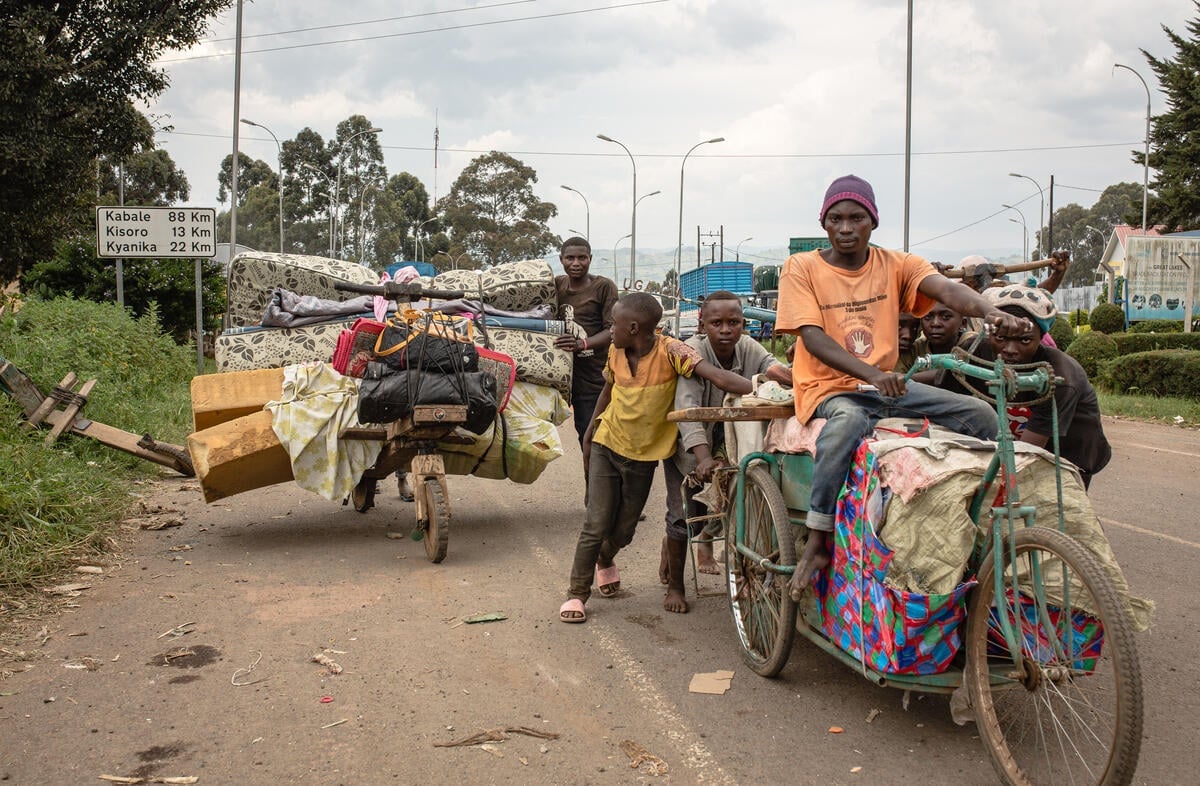Livelihoods and economic inclusion
Livelihoods and economic inclusion
UNHCR works to promote livelihoods and economic inclusion for refugees. We advocate for their right to work and support them in becoming more resilient and achieve self-reliance.

Through decent work, refugees and displaced people can provide for their families’ needs, maintain their dignity, become more resilient and be empowered to shape their future. Being able to work and making use of their skills and talents also allows refugees to contribute to their host communities.
How does UNHCR help?
We help people who were forced to flee their homes and are now living in a new community by promoting their economic inclusion, advocating for their right to work and supporting their inclusion in government social protection systems. We support refugees to gain access to the labour market in their host communities, which in turn allows them to seize economic opportunities.
As part of our work, we collaborate with a wide range of partners, including States, development and humanitarian organizations, the private sector and civil society to enhance economic outcomes for refugees as well as host communities:
- Inclusive market systems – When designing effective interventions that will support refugees to work in local markets, a comprehensive understanding of the market system and the barriers for refugee inclusion is key. We work with the International Labour Organization and other partners to promote an inclusive market systems framework.
- Financial inclusion – Most refugees have no access to financial services, which limits their capacity to engage in sustainable livelihoods. We work with financial service providers and relevant partners to remove these barriers.
- Poverty Alleviation Coalition – Many refugees live in extreme poverty and vulnerability. The Poverty Alleviation Coalition is a global coalition of non-governmental organizations, led by UNHCR together with the Partnership for Economic Inclusion of the World Bank. The coalition aims to empower the poorest refugees and their host communities to move out of poverty through the Graduation Approach.
- Agriculture and food security – Refugees in rural areas count on farming to eat and earn a living. We work with the Food and Agriculture Organization of the UN and other partners to support refugees' inclusion in agriculture value chains and improve their income while ensuring healthy and nutritious food for everyone.
- Social protection systems – We work to include refugees and asylum seekers in government systems and align UNHCR assistance to these systems. This provides predictable means for vulnerable families to meet basic needs, access family and social welfare services and support access to jobs and complementary decent work and health insurance benefits.
- Data and analysis – Data is critical to policy-making and programming. We work with partners to improve the collection and analysis of socio-economic data and build a useful data library.
Economic inclusion for refugees: How can it be achieved?
Empowering refugees to earn a decent living and participate in local economies requires the engagement of a broad range of stakeholders. UNHCR’s role is to advocate for and convene different stakeholders and foster collaboration between them. To this end, we are building partnerships with financial service providers, development agencies and private sector companies. In environments where work is already underway to strengthen refugees’ livelihoods, we coordinate with governments, humanitarian and development actors, the private sector and other partners to enhance inclusion and access of refugees to employment and entrepreneurship opportunities and related services and programs.
A roadmap to empower refugees to lead productive lives: The Global Compact on Refugees
In December 2018, the United Nations General Assembly affirmed the Global Compact on Refugees – a blueprint for governments, international organizations and other stakeholders to ensure that host communities get the support they need and that refugees can lead productive lives.
The compact positions itself as a means of mobilizing support to ensure refugees and their host communities share in a country’s progress towards the Sustainable Development Goals.
Learn more about the Global Compact on Refugees.
Do refugees have access to the right to work?
The right to work includes the opportunity for people to earn a living through freely chosen or accepted work. The right to work encompasses all forms of work, from independent self-employment to jobs that pay wages or salaries. The result of the right to work is the right to just and favourable work conditions. In other words, these two rights provide everyone, including refugees, equal access to decent work opportunities without discrimination and regardless of legal status and documentation.
Under international law, decent work for everyone is provided through Article 23 of the Universal Declaration of Human Rights. It is given binding force by Articles 6 and 7 of the International Covenant on Economic, Social and Cultural Rights. In addition, the International Labour Office ILO has developed international labour standards that apply to all workers, including refugees.
Articles 17, 18 and 19 of the 1951 Refugee Convention explicitly recognize refugees’ right to access the labour market, prescribing a level of treatment for refugees relative to their legal attachment to the country of asylum. Article 24 sets out the right of refugees to benefit from labour legislation and social security.
To facilitate access to decent work, States must take deliberate, concrete and targeted steps to stimulate economic growth and development, raise living standards and overcome unemployment and underemployment. States must also pursue full and productive employment while safeguarding fundamental political and economic freedoms and reducing the informal economy.
Developing States that have limited resources are permitted to provide access to employment opportunities for refugees gradually if necessary. These States must still take steps to realize access to decent work for everyone, including refugees, by seeking international assistance and cooperation.
To access decent work, refugees need, among other things, to exercise their right to freedom of movement, to form and join trade unions and other labour associations, to have their previous qualifications recognized and to have access to vocational and other training opportunities. Refugees also need to be able to contribute to and make use of social security benefits, as well as have access to effective remedies to enforce their right to access decent work opportunities.
Percentage of refugees with full legal right and unrestricted access in practice to employment in 2023
The 2023 Global Compact on Refugees (GCR) indicator report, derived from data gathered from 99 countries encompassing 32 million refugees, reports an estimated 67% of refugees possess full legal rights to the labour market in 2023.
According to the 2023 Global Survey on Livelihoods and Economic Inclusion, which collected data from 132 countries and reflected the experiences of over 34.5 million refugees, an estimated 45% of refugees reside in countries with unrestricted access to formal employment in 2023. This implies a significant deviation of 22 percentage points between legal entitlements and practical access to formal employment and highlights the impact of practical barriers to limit inclusion despite conducive national legal frameworks.
Percentage of refugees living in countries with unrestricted access in practice to formal employment, 2019-2023
The Global Survey on Livelihoods and Economic Inclusion reveals a positive trend in refugees’ access, in practice, to formal employment since its first edition in 2019.
The estimated percentage of refugees residing in countries with unrestricted access to formal employment has increased notably, rising from 18% in 2019 to 38% in 2021 and further to 45% in 2023. This is despite a considerable increase in the number of refugees since 2019 (from 19.9 to 34.5 million). This positive trend can be partially attributed to commitments and pledges made by States, a momentum initiated during the inaugural Global Refugee Forum in December 2019, which continues today.
Top restrictions to access in practice of refugees to formal employment opportunities in 2023
Despite the positive trend in the practical access of refugees to formal employment, in 2023, an estimated 55% of refugees reside in countries where access to formal employment remains restricted or non-existent in practice. Various administrative and practical hurdles, coupled with challenges in the recognition of skills and diplomas, contribute to the difficulties refugees face in gaining practical access to formal employment.
Additionally, a lack of awareness among employers regarding refugees' right to work further compounds these challenges. Factors such as the need for permits (residence and work), high unemployment rates in host countries, and refugees' insufficient language skills for the national or global labour market act as additional barriers, constraining their practical access. The top seven reported restrictions to access formal employment in 2023 are comparable to 2021, with some changes in their comparative ranking.









